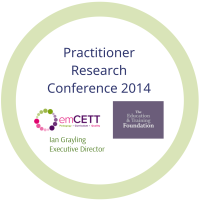The aim of the programme was to:
- enable practitioners to identify and enquire into real problems or issues that they encounter in their work;
- develop practitioners’ capacity to critically question their experience and reflect upon their actions;
- link practice to its underpinning theory by using theory to question practice and practice to question and inform theories; and
- be accessible to and usable by other practitioners in similar situations.

A blended model of support was provided through peer working groups; face-to-face meetings/ email/ telephone conversations with regional advisers; webinars; an eCPD module; and e-guide to multimodal reporting. Practitioners were also offered the opportunity to undertake accreditation.
The opportunity to take part in the programme was advertised through a wide variety of networks, including ACETT, AoC, AELP, The Education and Training Foundation, Holex, regional adviser contacts and Skills for Life Network.
This resulted in:
- 76 applications
- 63 bursaries awarded
- 60 action research reports produced
- 15 participants undertook the accreditation route
 Find out more about the types of providers engaged and what happened during the programme by watching the Prezi produced for The Education and Training Foundation’s Practitioner Research conference held on the 8th July 2014.
Find out more about the types of providers engaged and what happened during the programme by watching the Prezi produced for The Education and Training Foundation’s Practitioner Research conference held on the 8th July 2014.
